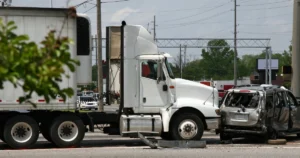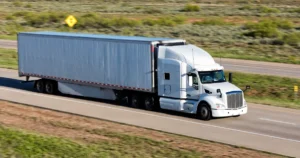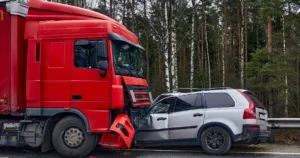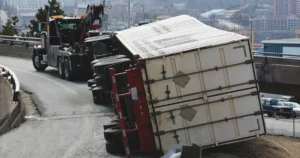After a truck crash in South Bend, evidence could begin disappearing immediately, potentially weakening your case before it even begins. Physical debris gets cleared away, electronic data might be overwritten, and witness memories fade with each passing hour.
Table of Contents
- What Evidence Needs to Be Protected After a Truck Accident?
- Can the Trucking Company Destroy Evidence After Our Crash in South Bend?
- What Is a Spoliation Letter and How Does It Affect My Case?
- Steps South Bend Truck Crash Lawyers Take to Secure Electronic Evidence
- Special Evidence Protection Laws That Could Effect Your Truck Crash Case
- Why Having a Knowledgeable South Bend Truck Crash Attorney Matters for Evidence Protection
- Injured In a Trucking Accident? Contact Our Pfeifer Morgan & Stesiak Truck Accident LawyersPreview (opens in a new tab)
 At Pfeifer Morgan & Stesiak, our dedicated South Bend truck crash attorneys understand the unique challenges of preserving evidence in truck crash cases. We act swiftly to preserve evidence that may support and strengthen your case.
At Pfeifer Morgan & Stesiak, our dedicated South Bend truck crash attorneys understand the unique challenges of preserving evidence in truck crash cases. We act swiftly to preserve evidence that may support and strengthen your case.
Need Legal Help? Call Our Trusted Law Firm Today. There are no upfront costs or fees when we fight for your justice.
Request your FREE case review today.(574) 444-0741
What Evidence Needs to Be Protected After a Truck Accident?
Truck crashes are very different from car crashes, and this includes evidence. If immediate action is not taken, you may miss the window to preserve key evidence that might otherwise be lost forever. Without your attorney taking immediate legal steps to preserve evidence, critical details about how the crash occurred is at risk of being tampered with and could vanish within hours. This leaves you at a significant disadvantage against powerful trucking companies, their insurers, and their legal team.
Evidence that needs to be protected after a collision involving a semi-truck, big rig or other commercial vehicle includes:
Electronic Data Recorder (EDR) – the “Black Box”
EDRs critical pre-crash information including vehicle speed, sudden deceleration, brake application timing, and engine performance metrics. Trucking companies can reset these devices or overwrite this data within days if not properly preserved through immediate legal action.
Driver Hours of Service Logs
Federal regulations require commercial drivers to maintain accurate records of driving and rest periods, but these paper or electronic logs can be modified after a crash to hide hours-of-service violations. Supporting documentation like fuel receipts and weigh station records that could contradict falsified logs may disappear quickly.
GPS Tracking Evidence
Modern commercial trucks utilize GPS tracking systems that can record detailed location data, routes taken, stops made, and driving behaviors such as speeding or erratic movements. This valuable electronic evidence can be deleted, altered, or overwritten unless legally secured through prompt preservation demands.
Vehicle Inspection Reports
Drivers must conduct pre-trip and post-trip inspections documenting vehicle condition and mechanical issues. These reports often reveal prior knowledge of maintenance problems that contributed to crashes, but companies frequently “clean up” these records after incidents occur.
Drug and Alcohol Testing Results
Federal regulations require post-crash substance testing for commercial drivers, but delays in testing can compromise results. Companies sometimes postpone testing or interfere with proper protocols, making immediate demands for proper testing procedures essential to preserve this evidence.
Dashcam and Camera Footage
Many trucks now feature forward-facing and driver-facing cameras that capture crucial moments before and during crashes. This footage operates on loop recording systems that automatically delete older video unless specifically preserved, often within just 24-72 hours after an incident.
Can the Trucking Company Destroy Evidence After Our Crash in South Bend?
No, trucking companies cannot legally destroy evidence after a crash, but it happens frequently without proper legal intervention. Federal regulations require commercial carriers to preserve certain records, yet many companies find ways to “lose” unfavorable evidence when liability seems clear.
Without immediate legal action from an attorney, crucial evidence often disappears through routine business operations rather than deliberate destruction. Even normal vehicle repairs, routine data purges, or standard record maintenance can permanently erase critical information that would have supported your case.
What Is a Spoliation Letter and How Does It Affect My Case?
A spoliation letter is a formal legal document sent immediately after your crash that creates a legal duty to preserve all evidence. This prevents companies from destroying crucial information and establishes serious consequences if evidence later disappears.
The letter specifically identifies every type of evidence that must be preserved, from electronic data to physical components. When evidence is destroyed after receiving a spoliation letter, courts can impose severe penalties, including instructions that jurors assume the missing evidence would have hurt the company’s case.
Steps South Bend Truck Crash Lawyers Take to Secure Evidence
Your Pfeifer Morgan & Stesiak truck crash attorneys use immediate precaution to secure vital electronic evidence before it disappears forever. We issue formal spoliation letters within 24 hours to ensure data that could support your case is not destroyed or deleted.
A spoliation letter will include the following:
- Specific preservation requirements for electronic control modules, preventing data overwriting.
- Explicit language that transforms routine data deletion into sanctionable spoliation of evidence.
- Demand for immediate files of electronic logging device data in unaltered, verifiable formats.
- Exact GPS tracking information timeframes to prevent selective data preservation.
- Preservation of all driver communication records, including texts, emails, and computer messages.
- Backup copies of all telematics data showing vehicle operation and maintenance alerts.
- Verification that automatic deletion protocols for digital systems have been suspended.
- Legal documentation that makes any evidence destruction actionable in court.
These actions are all vital as they set up the groundwork to ask the judge to assume the worst about trucking company/truck driver if they lose or destroy evidence.
Special Evidence Protection Laws That Could Effect Your Truck Crash Case
Indiana Rule of Evidence 901 requires authentication of all evidence, creating strict chain of custody requirements. Indiana Trial Rule 37 provides powerful sanctions for evidence spoliation, but only when proper preservation demands were documented before destruction occurred.
The Federal Motor Carrier Safety Administration (FMCSA) requires trucking companies to preserve logs for six months, creating urgent preservation timelines. Indiana’s comparative fault laws makes evidence protection even more critical, as missing evidence can shift blame percentages and dramatically reduce compensation.
Injured In a Trucking Accident? Contact Our Pfeifer Morgan & Stesiak Truck Accident Lawyers
At Pfeifer Morgan & Stesiak, our experienced truck accident attorneys are prepared to fully manage your case from the moment you hire our firm. This includes taking immediate action to preserve evidence. We fight aggressively against a trucking company’s attempts to hide or tamper with information that supports your case.
Contact our South Bend truck crash attorneys today for a free consultation, or complete our simple online form. We work on contingency, there are no costs or fees when we fight for your justice.
Experienced Lawyers. Proven Results. Call: (574) 444-0741 today




